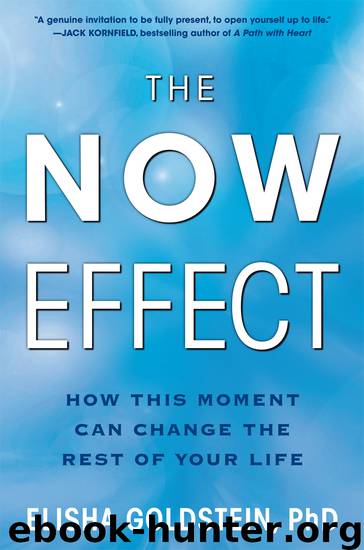The Now Effect by Elisha Goldstein

Author:Elisha Goldstein
Language: eng
Format: epub
Published: 0101-01-01T00:00:00+00:00
36
_______
THE SEEDS OF RESILIENCY
Richard Shankman is a mindfulness teacher who spent years taking mindfulness programs to state prisons and drug and alcohol rehab centers. It didn’t take long for him to respond when the opportunity arose to take a five-week program to inner-city children at Emerson Elementary in Oakland, California. They were kids who struggled with adversity and didn’t seem to have much peace or promise in their lives. When ABC News caught wind of the program, it went over to check out what was going on and interviewed Richard and the students.
One fourth grader in the program said, “Before a test, if I’m nervous, I just breathe, calm down, and it sends a message to my mind that I can make it!”
Even in the face of adversity, the positive feelings of calm and hope naturally arose. This is the Now Effect in action. The practices they had been doing influenced that young boy’s belief system and this could very well change the rest of his life. Richard went on to cofound Mindful Schools, which has touched the lives of more than ten thousand children and more than a thousand adults.
Researchers have been looking into what sows the seeds of resiliency. Resiliency gives us the ability to roll with the punches or, when we’re knocked down, to get up more quickly.
In Dr. Richard Davidson’s study on the brain and resiliency there were two groups; one went through an eight-week Mindfulness-Based Stress Reduction (MBSR) program and the other did not. The subjects who did the MBSR program showed more significant increases in activity in the left side of the brain, which is associated with positive emotions and regulation of emotions, than the control group did. The MBSR group also showed an increase in antibodies to a flu vaccine, providing neuroscientific proof of the benefits of mindfulness and resiliency.
George, a forty-two-year-old man suffering from obsessive-compulsive disorder and panic attacks, came to a mindfulness group I was leading. One day during the group meeting I noticed that he was beginning to breathe faster and sweat was forming on his brow. I asked him how he was doing, and he told the group that he thought he was having a panic attack. We all paused as I led him through the STOP practice. After it was over, his breath appeared steadier and he seemed calmer. His eyes opened, brimming with tears, and he said, “I can do this,” as he moved out of the moment of difficulty and into a place of greater balance.
As we learn how to drop down out of the maelstroms of our minds and into the here and now, we cultivate a sense of self-trust and self-reliance that breeds a strength that allows for a quicker return to balance. Throughout this section, reading about priming your mind for good and certainly engaging in the practices have already been encouraging a resilient mind.
Download
This site does not store any files on its server. We only index and link to content provided by other sites. Please contact the content providers to delete copyright contents if any and email us, we'll remove relevant links or contents immediately.
| Acupuncture & Acupressure | Aromatherapy |
| Ayurveda | Chelation |
| Chinese Medicine | Energy Healing |
| Healing | Herbal Remedies |
| Holistic | Homeopathy |
| Hypnotherapy | Massage |
| Meditation | Naturopathy |
| Reference |
Inner Engineering: A Yogi's Guide to Joy by Sadhguru(6780)
The Power of Now: A Guide to Spiritual Enlightenment by Eckhart Tolle(5737)
Fear by Osho(4724)
Ikigai by Héctor García & Francesc Miralles(4228)
The Art of Happiness by The Dalai Lama(4118)
The Ultimate Bodybuilding Cookbook by Kendall Lou Schmidt(3923)
Yoga Therapy by Mark Stephens(3739)
The Little Book of Hygge by Meik Wiking(3675)
The Healing Self by Deepak Chopra(3563)
Why Buddhism is True by Robert Wright(3438)
The Hatha Yoga Pradipika (Translated) by Svatmarama(3311)
Being Aware of Being Aware by Rupert Spira(3264)
Shift into Freedom by Loch Kelly(3189)
Wild Words from Wild Women by Stephens Autumn(3132)
Work Clean by Dan Charnas(3106)
Happiness by Matthieu Ricard(3036)
More Language of Letting Go: 366 New Daily Meditations by Melody Beattie(3017)
Yoga Body & Mind Handbook by Jasmine Tarkeshi(2861)
Why I Am Not a Feminist by Jessa Crispin(2737)
